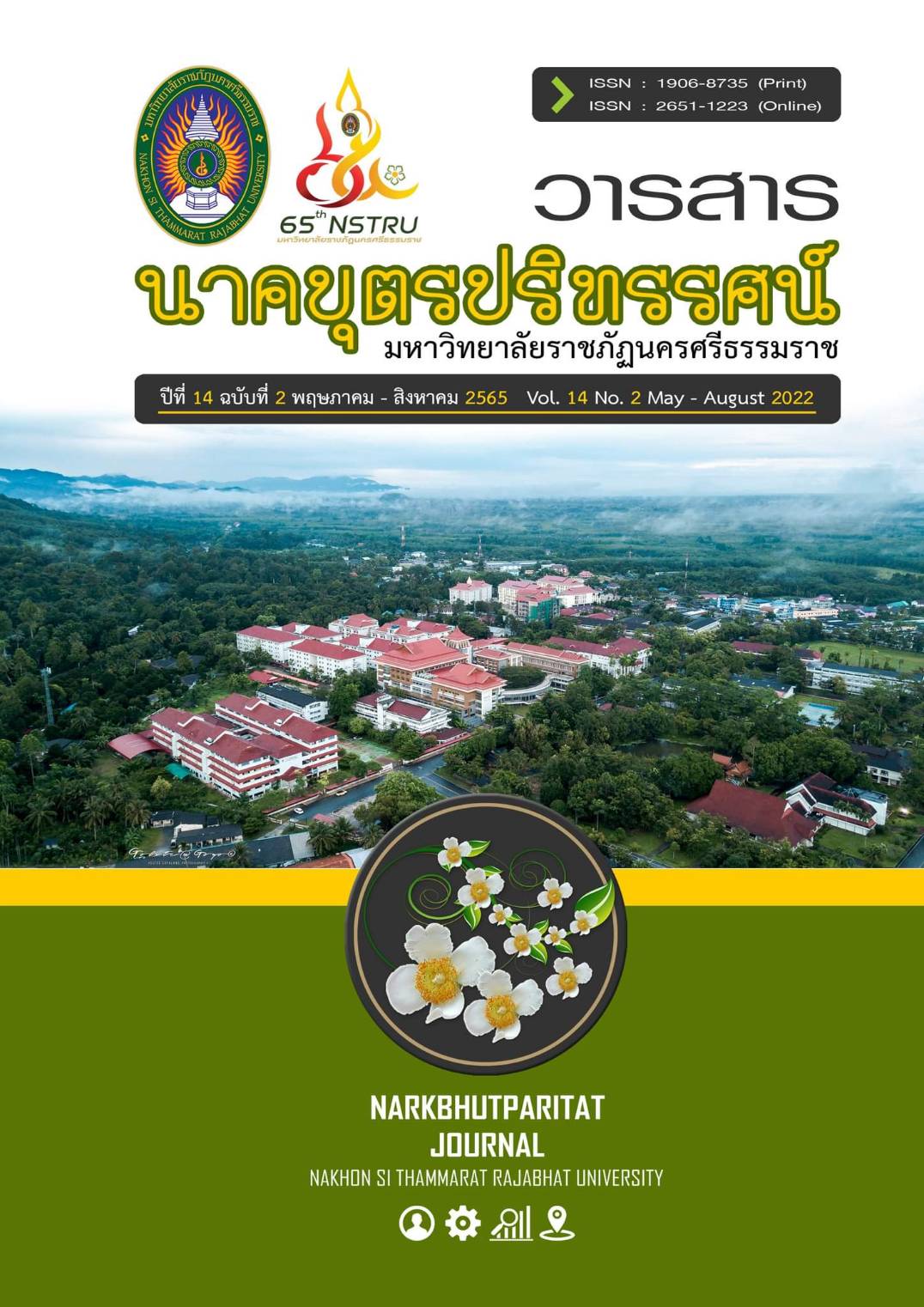การศึกษาผลสัมฤทธิ์ทางการเรียน เจตคติต่อวิชาวิทยาศาสตร์ และทักษะการทำงานร่วมกับผู้อื่นของนักเรียนชั้นมัธยมศึกษาปีที่ 3 โรงเรียนปากพนัง ที่ได้รับการจัดการเรียนรู้แบบ CCR เรื่อง การต่อวงจรไฟฟ้าอย่างง่าย
Main Article Content
บทคัดย่อ
การวิจัยครั้งนี้มีวัตถุประสงค์เพื่อ 1) เปรียบเทียบผลสัมฤทธิ์ทางการเรียนก่อนและหลังการจัดการเรียนรู้แบบ CCR ของนักเรียนชั้นมัธยมศึกษาปีที่ 3 2) เปรียบเทียบผลสัมฤทธิ์ทางการเรียนหลังการจัดการเรียนรู้แบบ CCR ของนักเรียนชั้นมัธยมศึกษาปีที่ 3 กับเกณฑ์ร้อยละ 70 3) ศึกษาเจตคติต่อวิชาวิทยาศาสตร์หลังการจัดการเรียนรู้แบบ CCR ของนักเรียนชั้นมัธยมศึกษาปีที่ 3 และ 4) ศึกษาทักษะการทำงานร่วมกับผู้อื่นหลังการจัดการเรียนรู้แบบ CCR ของนักเรียนชั้นมัธยมศึกษาปีที่ 3 กลุ่มตัวอย่างที่ใช้ในการวิจัยเป็นนักเรียนชั้นมัธยมศึกษาปีที่ 3โรงเรียนปากพนัง จำนวน 40 คน ที่ได้มาโดยการเลือกแบบเจาะจง (Purposive sampling) เครื่องมือที่ใช้ในการวิจัย ได้แก่ แผนการจัดการเรียนรู้แบบ CCR แบบทดสอบวัดผลสัมฤทธิ์ทางการเรียนวิชาวิทยาศาสตร์ เรื่อง
การต่อวงจรไฟฟ้าอย่างง่าย แบบประเมินเจตคติต่อวิชาวิทยาศาสตร์ และแบบประเมินทักษะการทำงานร่วมกับผู้อื่น สถิติที่ใช้ในการวิเคราะห์ข้อมูล ได้แก่ ค่าเฉลี่ย ส่วนเบี่ยงเบนมาตรฐาน t-test Dependent Sample และ t-test One Sample
ผลการวิจัยพบว่า 1) นักเรียนชั้นมัธยมศึกษาปีที่ 3 มีผลสัมฤทธิ์ทางการเรียนหลังเรียนสูงก่อนการจัดการเรียนรู้แบบ CCR อย่างมีนัยสำคัญทางสถิติที่ระดับ .05 2) นักเรียนชั้นมัธยมศึกษาปีที่ 3 มีผลสัมฤทธิ์ทางการเรียนหลังจัดการเรียนรู้แบบ CCR สูงกว่าเกณฑ์ร้อยละ 70 อย่างมีนัยสำคัญทางสถิติที่ระดับ .05 3) นักเรียนชั้นมัธยมศึกษาปีที่ 3 มีเจตคติต่อวิชาวิทยาศาสตร์หลังการจัดการเรียนรู้แบบ CCR โดยรวมอยู่ในระดับมาก ( = 4.20, S.D. = 0.71) และ 4) นักเรียนชั้นมัธยมศึกษาปีที่ 3 มีทักษะการทำงานร่วมกับผู้อื่นหลังการจัดการเรียนรู้แบบ CCR โดยรวมอยู่ในระดับมาก ( = 4.27, S.D. = 0.83)
Article Details

อนุญาตภายใต้เงื่อนไข Creative Commons Attribution-NonCommercial-NoDerivatives 4.0 International License.
เอกสารอ้างอิง
Manomai, S., Chimpalee, B. & Promma, T. (2021). A Study of Scientific Achievements, Teamwork Skills and Attitude toward Science of Secondary Grade 1 By Using CCR Learning Activities. In the 1th Kamphaeng Phet Rajabhat University Students national Conference, (pp.160-169). Kamphaen Phet: Kamphaeng Phet Rajabhat University (in Thai)
Ministry of Education. (2017). Basic Education Core Curriculum B.E. 2017 (A.D. 2008). Bangkok: Agricultural Cooperative Federation of Thailand Printing house. (in Thai)
_______. (2019). National Education Act, B.E. 1999 (No. 2) and the amendment to the 2019 B.E. Bangkok: Kurusapa Printing Ladphrao. (in Thai)
Phanchaphetkeao, A. (2017). Effects of Contemplative Learning in Psychology for Teachers on Learning Achievement and Self-Directed Learning Readiness of Students with Different Learning Levels of Achievement. Songkla: Prince of Songkla University. (in Thai)
Paweenbampen, P. (2017). Research-Based Learning. CMU Journalof Education. 1(2), 62-71. (in Thai)
Pusiripinyo, V. (2018). Developing a Teaching Model Integrated the Concepts of Contemplative Education, Research-based Learning, and Coaching for Preparing Student Teachers, Majoring in English to Community. Academic Journal of Buriram Rajabhat University.
(10), 97-122. (in Thai)
Roning, F. (2017). Effects of the Contemplative Learning Approach on Learning Achievement and Learning Satisfaction in Thai Subject of Grade Seventh Students. Songkla: Prince of Songkla University. (in Thai)
Reungdam, S. (2018). The Effects of Integrating the Concept of Contemplative Education, Coaching and Mentoring and Research based Learning to Change Teaching Behavior and Development of Teaching Competency of Teacher Students in Thai Language major. Narkbhutparitat Journal Nakhon Si Thammarat Rajabhat University, 10(2), 15-25. (in Thai)
The Institute for the Promotion of Teaching Science and Technology. (2017). measurement of science evaluations. Bangkok: The Institute for the Promotion of Teaching Science and Technology. (in Thai)
_______. (2017). Organizing classes for science groups basic education course. Bangkok: The Institute for the Promotion of Teaching Science and Technology. (in Thai)


